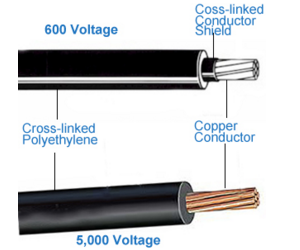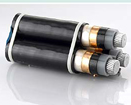NEWS & EVENTS
HOT PRODUCT
- 600/500V Airport Ligting Cable
 1. Voltage: 600/5000 Voltage; 2. Conductor: Copper; 3.Shield: Cross-linked Polyethlene(XLPE)-5kv; 4Insulated: Cross-linked Polyethlen...
1. Voltage: 600/5000 Voltage; 2. Conductor: Copper; 3.Shield: Cross-linked Polyethlene(XLPE)-5kv; 4Insulated: Cross-linked Polyethlen... - MV Aerial bundle cable
 1.Voltage:10kv 33kv,2.support conductor:galvanized steel wire messenger
1.Voltage:10kv 33kv,2.support conductor:galvanized steel wire messenger
NEWS & EVENTS
- 0.6/1kv Cu 3-4 Core LSF (Flame Fire) PVC/PVC Power Cable
- 120 Volts Single Phase service entrance cable 2x8awg Aluminum SEU Cable price
- Fire proof cable F-FR-8 cable 0.6/1KV Rated voltage cable XLPE insulation FR-PVC sheath Power Cable
- PVC insulation single 25mm2 electric welding cable
- solid copper conductor 2.5mm Flat wire PVC insulated Flexible electric flat cable
- NYY-J PVC 0.6/1kV Power Cable
CONTACT US
- Tel: +86-371-6676-6667
- E-mail: huadong@hdcablegroup.com
- Fax:+86-371-8751-3085
- Msn: WhatsApp:8613939070673

News & Events
huadong 15years
Information Source:Huadong Cable Group-Zhengzhou Hongliang Cable Co., Ltd24 fiber Release date:01/03/2016
Ghana says it currently has a very robust power transmission system that connects the entire country as well as neighbouring countries like Togo, Benin and Nigeria; and this, the country said, was targeted at helping it realise its goal of becoming a power transmission hub in West Africa.
The country also sees itself as superior to Nigeria as far as power transmission is concerned, saying Nigeria could be a beneficiary of its numerous feats in power management, especially in the area of transmission.
The Chief Director, Ministry of Energy and Petroleum in Ghana, Prof. Thomas Mba-Akabzaa, who spoke to our correspondent in Lagos on the sidelines of the ongoing West African Power Industry Convention, said the transmission network was also expected to link Ivory Coast and Burkina Faso.
“We hope to expand this infrastructure and ensure that we situate the country as a hub because when we have a very robust distribution network on the sub-continent; then we will be able to compete clearly with a country like Nigeria,” he said.
He said Ghana realised that there was a very strong market particularly in Nigeria, and it needed to have a very advanced transmission network to have the required advantage over any of the countries around.
He said, “With this, we should be able to sell electricity across the sub-continent.”
Ghana, he confirmed, currently has a population of 24 million, and now has a total capacity of 3,000 megawatts of energy generation in place.
On the country’s current generation status, he said, “It is below demand. And by 2016, we are expecting a total of 5,000MW; but a recent analysis indicated that the 5,000MW by 2016 will be lesser than what the population would require. So, we have raised our target to 7,500MW by 2016.
“We are trying to achieve this with the hydro resources that we have, as well as our thermal resources – especially gas-based plants. We are exploring seriously renewable energy sources. Ghana currently has a massive solar energy plant -the biggest in the sub-region so far.”
Mba-Akabzaa said under the West Africa Gas Pipeline, Nigeria was supposed to supply the N-Gas spec to Ghana, which he said was being faced by some big challenges.
With the successful privatisation of power distribution and generation companies in Nigeria, he said upcoming power plants in Nigeria needed gas, which had made gas supplies to Ghana to be erratic.
He said, “Currently, Nigeria is supplying 35 million standard cubic feet of gas to Ghana per day, that is enough to cover a 200MW plant. If you look at the contractual volumes, Ghana is supposed to supply about 130mmscf. The frequent vandalism of the West Africa Gas pipeline is also not helping matters. “We are looking at developing our own gas facility, which will supply about 150mcsf. This will come on stream before the year ends. This will not stop our gas importation from Nigeria because the gas plants are not as big as those in Nigeria. More so, we have another gas plant that will come on stream between 2016 and 2017, and will be supplying about 250mscf of gas per day. In all, we should have gas capacity of 400mscf.”
The Ghanaian minister said the country’s target of 7,500MW by 2016 would require about 500mscf. “That means there is a deficit. Nigerian gas will still be needed in Ghana for probably the next 15 years,” he admitted.
On the interim, he said he does not expect the Ghanaian government to start selling power to Nigeria because “our own national requirement is huge.
“There are countries like Burkina Faso and Togo who have agreement with us. We currently sell power to Togo and Benin. We have a power exchange programme with Cote d’ivoire. Sometimes they give us power, and we also give them. We hope the arrangement with Nigeria will be like that of Ivory Coast. Maybe, given the fact that we have much more nice infrastructure than Nigeria currently, at the initial stages, we probably will be supplying power to Nigeria.
“But given the potential of Nigeria, and the fact that Nigeria has a lot of gas resources, I think in the next 10 years, Ghana might be taking power from Nigeria.”
In the immediate term, he said Ghana might be supplying Nigeria with power, but added that in the long term, the country was hoping that Nigeria would be supplying power to it, as that was the reason the connectivity exists so that whoever has excess could supply other markets.
Mba-Akabzaa told our correspondent that 76 per cent of the Ghanaian households enjoyed power compared to big countries like Nigeria and South Africa. “We are the highest in Africa in terms of household coverage. But we think it is because of our population, which is quite small compared to most big countries,” he said.
Mid this year, the Federal Government said the $2.55bn sourced from local and international organisations had been earmarked for the revamping of power transmission infrastructure.
This was said to be coming as the Deposit Money Banks in the country expressed fears over the bottlenecks confronting the new owners of the privatised power generation and distribution firms.
The bankers’ apprehension was based on the fact that most of the owners of the power firms borrowed massively from the banks to finance the acquisition of the companies.
The leader of the Bankers’ Forum and Managing Director, Heritage Bank, Mr. Ifie Sekibo, while speaking during a meeting held at the Federal Ministry of Power in Abuja, had said the banks were concerned about three key issues affecting them since the power sector was privatised.
He outlined the issues as the poor state of the country’s power transmission network, hitches in the supply of gas to the power plants, and absence of an intervention fund for the banks that were supporting the sector.
“We have not come here to complain considering the giant strides, which the government has recorded in the power sector, but the above concerns are what we want you to help us address,” Sekibo said.
The Minister of Power, Prof. Chinedu Nebo, in a bid to calm the fears of the bankers, said a lot of funds had been pumped into the sector.
Already, the National Economic Council has recommended and the Presidency has approved a sum of $1.6bn from the proceeds of the sales of National Independent Power Projects just for transmission alone.
The minister said, “In addition to that, the World Bank has brought in a substantial amount of money; more loans are coming in and this is in excess of $500m. From the Eurobond that was oversubscribed, we had about $135m just for transmission. From the African Development Bank, the amount that is already being accessed is $150m just for transmission.”
Previous | 35kv 110 kv power cable Next | Canton fair Booth No 11.3 K47。

 Address:Factory: YunXiang East Road, Xiuwu Industry, Jiaozuo City. Office: Nanpu International Center, Jinshui dustrict, Zhengzhou City, Henan P.R. China.
Address:Factory: YunXiang East Road, Xiuwu Industry, Jiaozuo City. Office: Nanpu International Center, Jinshui dustrict, Zhengzhou City, Henan P.R. China. Phone: +86-371-6676-6667
Phone: +86-371-6676-6667 Email:
Email: